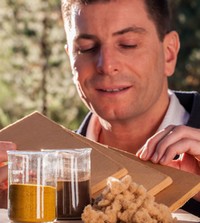Ground-breaking research through global connections

Research Leader Dr Warren Grigsby is a synthetic and polymer chemist investigating the production of bio-adhesives using renewable resources.
Working together with leading research organisations around the globe helps Scion’s research teams gain access to advanced scientific tools and helps foster innovative thinking. It also helps cement Scion as a world-leader in areas such as forestry management and genetics, biosecurity, bioenergy and bioproducts.
“It’s vital for our scientists to network with overseas connections to keep them challenged and to drive debate with others in similar fields,” says Scion’s General Manager for Sustainable Design, Dr Trevor Stuthridge. “That is why Scion is participating in numerous multi-party collaborations in, for example, Europe and North America, including working
strategically with sister organisations, such as FPInnovations in Canada and VTT in Finland.
“As a result, we are also gaining worldwide respect for our niche expertise. Our work in biofuels, for example, is now attracting investment from Korea.
“Most of this success is achieved by pooling shared expertise and specialist resources to produce ground-breaking research that could not be completed at any one institute, or even within a single country.”
One such collaboration with a commercial focus has been with global wood processing giant Sonae Industria Group. Business Development Manager Jeremy Warnes and materials scientist Damien Even have been working with Sonae at their plant in France and with companies in Italy, Hungary and the US to trial Scion’s innovative technology for the production of wood fibre ‘dice’ at a commercial level. The dice are used in the production of reinforced plastics and bioplastics. Sonae has recently extended their
Woodforce licence from Scion to develop this technology for North America.
According to Dr Elspeth MacRae, General Manager for Manufacturing and Bioproducts, Scion’s participation in the European Framework Programme (FP) and the European Cooperation in Science and Technology (COST) also extends our linkages with European research partners. “COST helps cooperation in common research projects, or Actions. It provides scientists with access to research grants and collaborations that span international borders through shared scientific goals, and the transfer of technology and expertise.”
COST Actions fund scientific exchange by way of Short Term Scientific Missions (STSMs). This enables some of Scion’s key scientists to visit, or work for a period of time at renowned research institutions such as Salzburg University (Austria) and the Royal Institute of Technology (KTH) in Sweden, providing opportunities to forge vital scientific relationships. These often lead to the publication of volumes of work co-written by scientists living in different hemispheres. Our work with bio-adhesives, biofuels, bio-energy, bio-plastics, wood fibre modification and in the development of lignin nano-fibres are just some of these collaborative COST Actions.
Dr Stefan Hill, Research Leader in Biopolymers and Chemicals, has been researching the molecular behaviour of dewatered wood. Together with colleague Dr David Sandquist, Dr Hill has the opportunity to further explore the movement of water molecules through various wood species using NMR technology at Wurzburg University, as well the dynamics of cellulose crystals using leading-edge synchrotron technology at the German DESY facility in Hamburg.
Dr Hill sums it up when he says, “Scion has a good range of people, expertise, scientific management structure and is open to opportunity - it’s blue sky. We punch above our weight and are well respected for our enthusiasm. We also work collaboratively and are not precious about our work, which is important when forging relationships.”
